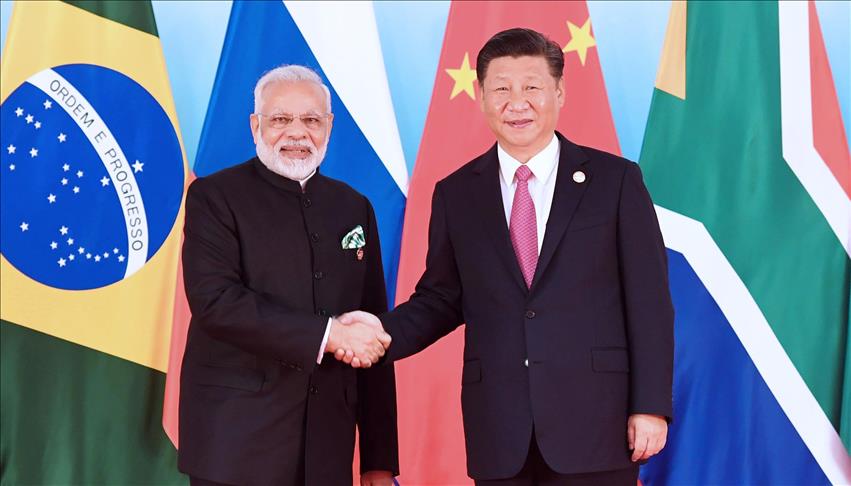Experts voice cautious optimism over India-China ties
Border differences, maritime competition among host of issues remaining between both sides despite Modi-Xi meeting in China
 China’s president Xi Jinping (R), Prime Minister of India Narendra Modi (L)
China’s president Xi Jinping (R), Prime Minister of India Narendra Modi (L)
By Ahmad Adil
NEW DELHI
A meeting between Indian and Chinese leaders last week on the sidelines of the Shanghai Cooperation Organization Summit has rekindled hopes of better ties, but experts say more efforts are needed to bring the countries closer.
The meeting between Prime Minister Narendra Modi and Chinese President Xi Jinping in Qingdao came after a year of strained relations in 2017. It followed an informal bilateral summit in Chinese city of Wuhan in April, which took place after a standoff lasting more than two months at the disputed border area of Doklam in Bhutan in 2017.
The Doklam crisis began mid-June in 2017 when India opposed the construction of a road by China at the border. Both sides then deployed troops in the border region resulting in a tense standoff. Late August 2017, India and China finally agreed to withdraw their respective armies from the disputed area.
Sameer Patil, a Mumbai-based security analyst, said border differences and maritime competition between India and China will play a role in bilateral ties despite the recent meetings between Modi and Xi.
“These two key issues will continue to determine the tone and tenor of this relationship,” Patil told Anadolu Agency, while also pointing out India's uncompromising position on the Belt and Road Initiative, which is part of China’s New Silk Road mega project.
Manoj Joshi, an expert at the New Delhi-based Observer Research Foundation told Anadolu Agency: “Certainly, both are trying to improve their relations and yes, their confrontation in Doklam is a factor [in strained relations between the two countries].”
With Xi accepting Modi's invitation for a Wuhan-style informal summit in India next year, commentators see hope in a boost in India-China relations.
“In the near term, I see the relationship on a positive track. This is evident from the recent SCO meeting. President Xi's commitment to visit India for an informal summit is a signal that for the present ties between the two countries will be stable,” said Joshi.
But there other issues apart from Doklam between the two countries, including China’s blocking of Indian efforts at the United Nations to designate Pakistan-based terrorists, India’s opposition to the Belt and Road Initiative and China’s opposition to India’s possible membership in the Nuclear Suppliers Group (NSG). In another significant development last year, India became part of the Quadrilateral initiative, which includes the United States, Japan and Australia -- a grouping which was perceived as an anti-China front.
“While there are still discordant notes between the two, the larger theme is how to reduce conflict. Possibly this is due to both leaders realizing that larger problems need to be addressed first while the bilateral relations need to be managed till then,” Prof. Srikanth Kondapalli, an expert on China affairs at the Jawaharlal Nehru University in New Delhi, told Anadolu Agency.
Modi himself remarked in Singapore at the Shangri La Dialogue last week that “Asia and the world will have a better future when India and China work together in trust and confidence, sensitive to each other's interests.”
But Kondapalli cautioned that it is hard to predict the future dynamic of India-China relations, “but as large economies, strategic depth, nuclear status it is hard to think that they can be at loggerheads [forever]”.
Anadolu Agency website contains only a portion of the news stories offered to subscribers in the AA News Broadcasting System (HAS), and in summarized form. Please contact us for subscription options.







